通用版小学英语小升初衔接课件之 词类---动词(共73张PPT)
文档属性
| 名称 | 通用版小学英语小升初衔接课件之 词类---动词(共73张PPT) | 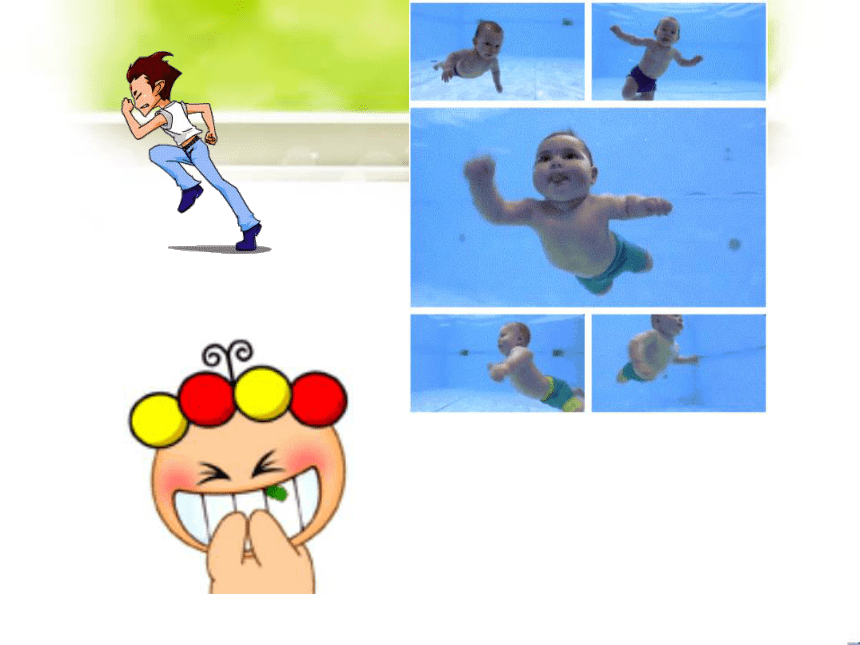 | |
| 格式 | pptx | ||
| 文件大小 | 1.4MB | ||
| 资源类型 | 教案 | ||
| 版本资源 | 通用版 | ||
| 科目 | 英语 | ||
| 更新时间 | 2024-10-20 08:24:28 | ||
图片预览


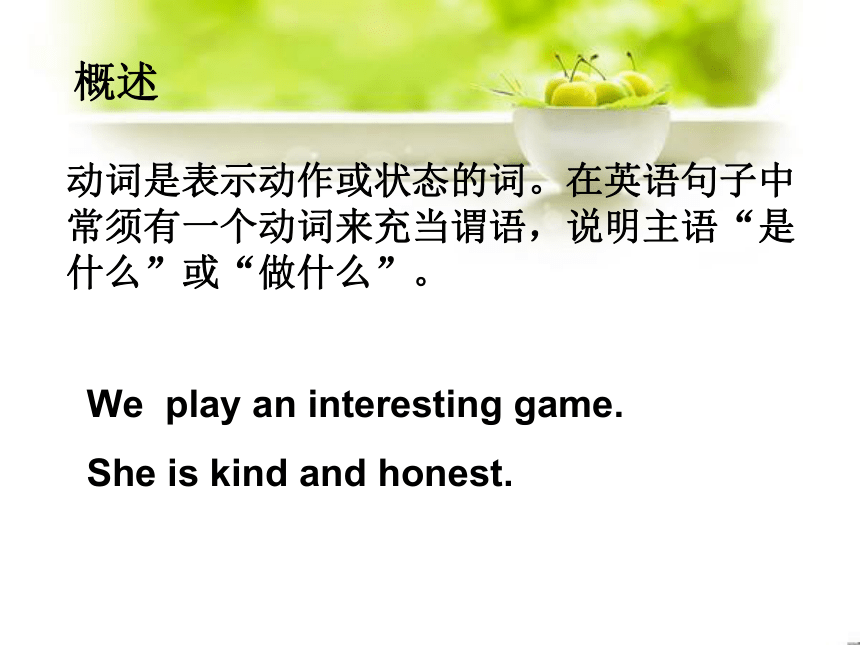
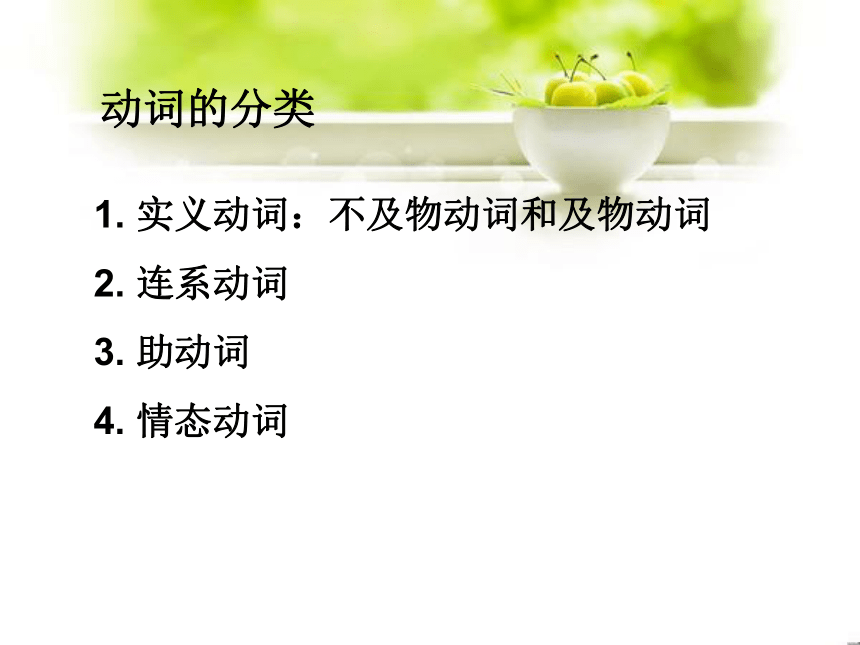
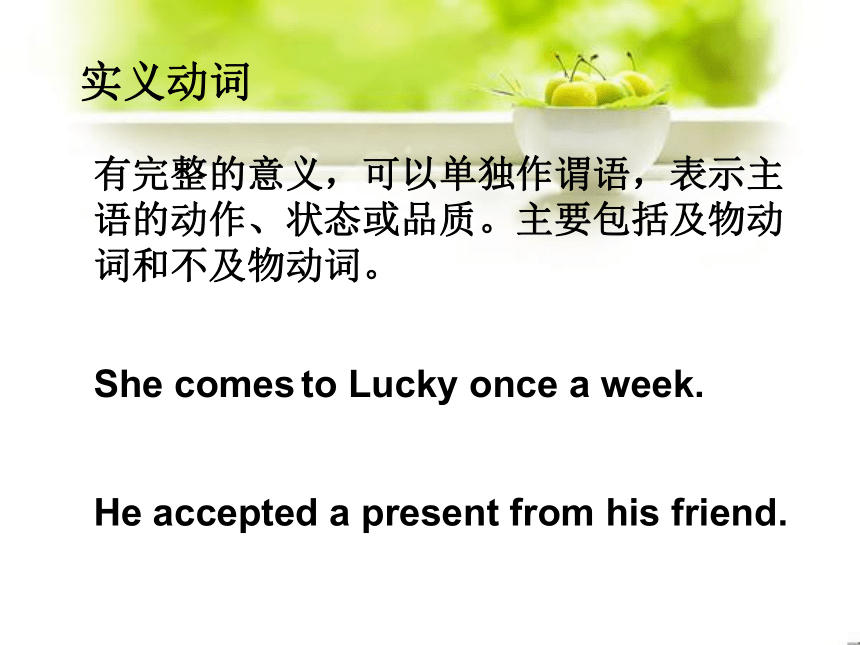
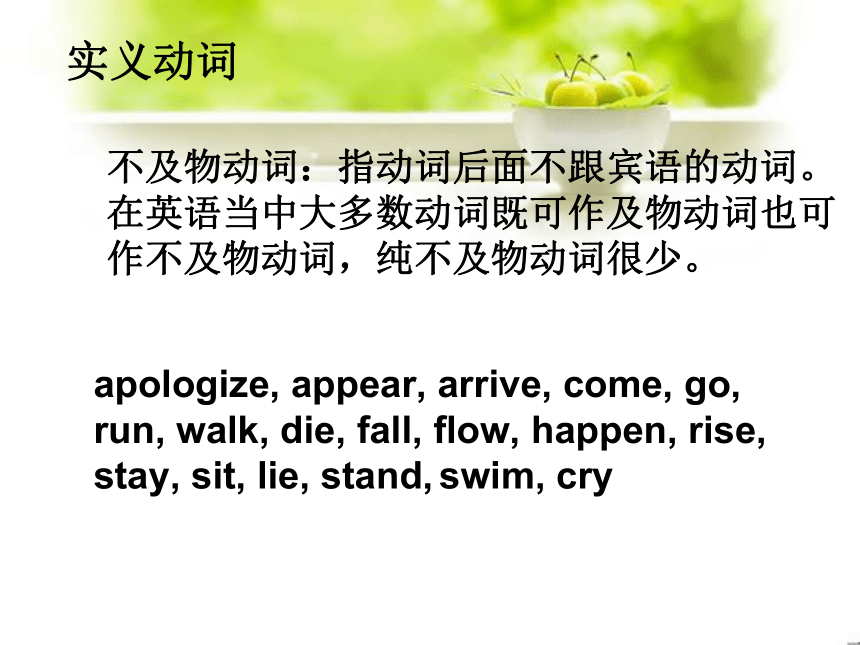

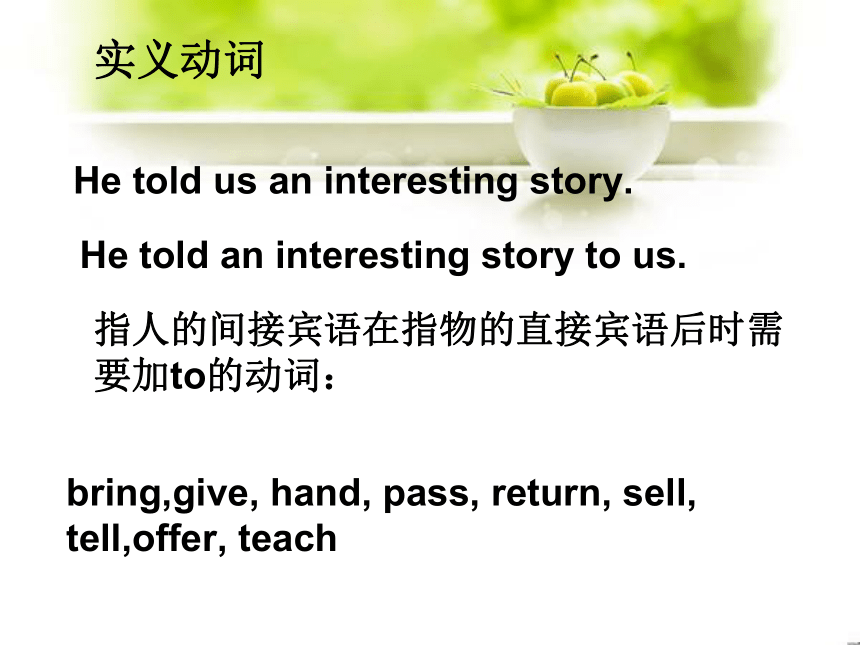
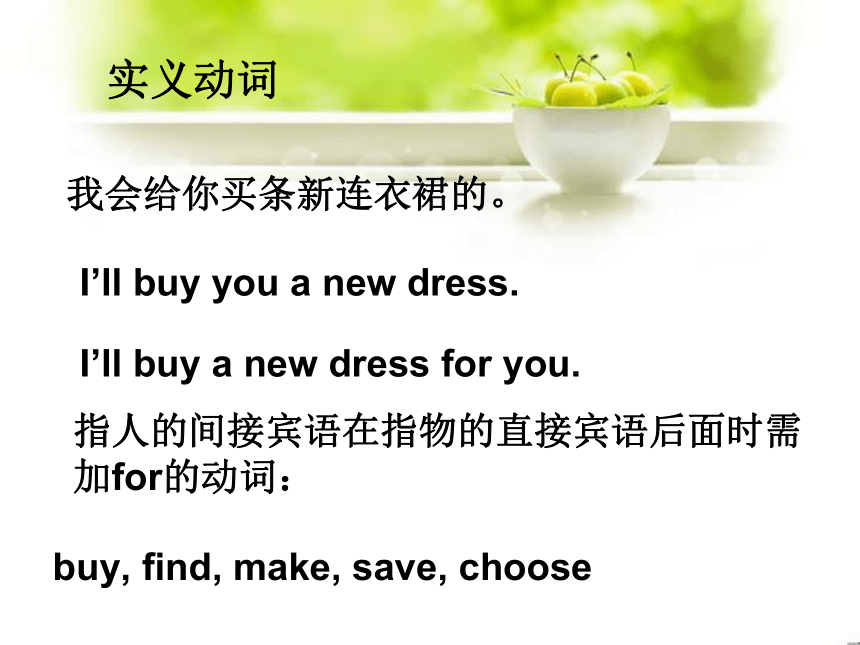
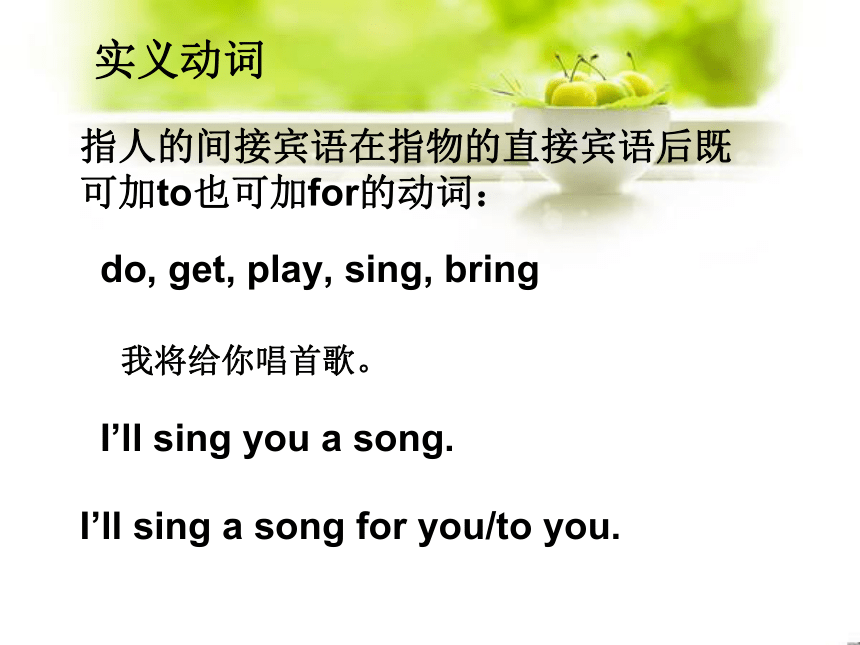

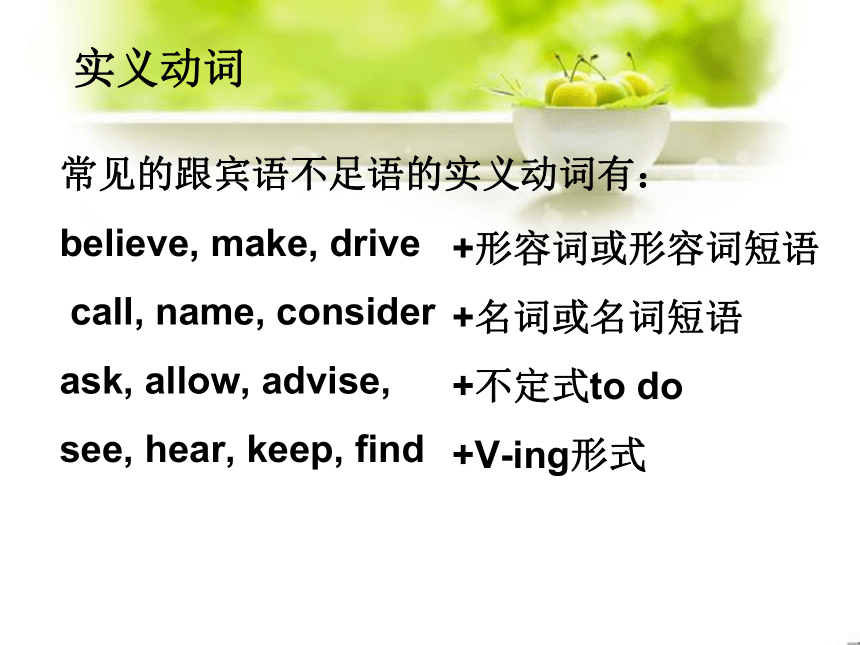
文档简介
(共73张PPT)
动词
verb
概述
动词是表示动作或状态的词。在英语句子中常须有一个动词来充当谓语,说明主语“是什么”或“做什么”。
We play an interesting game.
She is kind and honest.
动词的分类
1. 实义动词:不及物动词和及物动词
2. 连系动词
3. 助动词
4. 情态动词
实义动词
有完整的意义,可以单独作谓语,表示主语的动作、状态或品质。主要包括及物动词和不及物动词。
She comes to Lucky once a week.
He accepted a present from his friend.
实义动词
不及物动词:指动词后面不跟宾语的动词。在英语当中大多数动词既可作及物动词也可作不及物动词,纯不及物动词很少。
apologize, appear, arrive, come, go, run, walk, die, fall, flow, happen, rise, stay, sit, lie, stand, swim, cry
实义动词
及物动词:指动词后能接宾语的动词。
跟单宾语的及物动词,跟双宾语的及物动词以及跟宾语补足语的及物动词
He put a glass of water on the table.
He told us an interesting story.
We all believe him honest and kind.
实义动词
He told us an interesting story.
He told an interesting story to us.
指人的间接宾语在指物的直接宾语后时需要加to的动词:
bring,give, hand, pass, return, sell, tell,offer, teach
实义动词
我会给你买条新连衣裙的。
I’ll buy you a new dress.
I’ll buy a new dress for you.
指人的间接宾语在指物的直接宾语后面时需加for的动词:
buy, find, make, save, choose
实义动词
do, get, play, sing, bring
I’ll sing you a song.
I’ll sing a song for you/to you.
指人的间接宾语在指物的直接宾语后既可加to也可加for的动词:
我将给你唱首歌。
我会再给你找机会的。
我给你取些茶。
我把故事书还给他了。
I’ll find another chance for you.
I’ll get some tea to you/for you.
I returned the storybook to him.
实义动词
实义动词
常见的跟宾语不足语的实义动词有:
believe, make, drive
call, name, consider
ask, allow, advise,
see, hear, keep, find
+形容词或形容词短语
+名词或名词短语
+不定式to do
+V-ing形式
You drive me crazy.
实义动词
We consider him a strange person.
Mother often tells us to cross the road carefully.
Can you hear someone playing the piano next door
连系动词
连接主语和表示主语身份、性质、状态的动词称为连系动词。主要分为表状态的连系动词和表转变或结果的连系动词。
表状态的连系动词:be, apear,sound,look, smell, feel,seem, taste,stay,keep
表转变或结果的连系动词:become, get, grow, turn, go, come, fall, prove
连系动词
她诚实而又善良。
这个公园看起来很漂亮。
She is honest and kind.
The park looks very beautiful.
请站稳,我给你照片。
不管我什么时候看见她,她总保持沉默。
连系动词
Stand still and I’ll take a picture of you.
She always keeps silent whenever I see her.
连系动词
孩子们入睡快。
毕业后她当了护士。
他七岁失明。
Children fall asleep easily.
After graduation, she turned a nurse.
He went blind at the age of seven.
助动词
没有词义,不能单独充当谓语。表示否定,疑问,时态,语态等语法形式,加强语气
be, have, do, will, shall
助动词
be
1. 构成进行时态
be +doing
He is studying the courseware.
They were having an English class.
助动词
be
2. 构成被动语态
Be+动词的过去分词
The trees are watered every day by the old man.
A thief was caught by the police.
1.English is spoken in many countries.
2.The window wasn’t broken by Tom.
3.I was very curious about what you said.
4.Jane was waiting for me when I arrived.
5.The population of the world is rising very fast.
6.The economic situation is already very bad.
助动词
have
1. 构成完成时态
I have written the letter but I haven’t posted it yet.
I have drunk four cups of coffee today.
have + done(动词的过去分词)
助动词
have
2. have to 表示客观环境促使, 不得不
We have to finish our homework everyday.
I had to wait a long time for the bus.
Karen has to work on Saturday.
I have met a lot of people on the last few days.
Have you heard from George recently
I have supper at 6p.m. every day.
he has few friends there. So he feels very lonely.
助动词
do
1. 构成疑问句或否定句
Do you read newspaper everyday
I don’t know where your bag is.
助动词
do
2.加强语气
I do love you.
He does go to work on time.
He is always late. So he does.
助动词
do
3. 代替动词词组
----Do you like traveling
-----Yes. I do./No. I don’t.
----He goes to swim everyday.
-----So does she.
Do you understand what I mean
I don’t know how to learn a foreign language well.
3. After classes, you’d better do some exercises.
4. ----Shakespeare wrote many plays.
-----So he did.
5. ------Your hair looks nice.
------So does yours.
6. How did you do that
助动词
shall
构成将来时态(第一人称)
We shall go to play football after school.
will
构成将来时态
We will go to play football after school.
情态动词
情态动词本身有各种意义,但不能单独作谓语,只能和主要动词一起连用构成谓语,表示说话人的语气,情态。情态动词无人称和数的变化。
常用的情态动词:
can, could, may, might, must, should, shall, will, would, need, dare
情态动词
can/could
1.表示可能性
2.表示许可
3. 表示能力
情态动词
He can speak a little English.
I couldn’t speak well until I was five years old.
Can:表示现在的能力
Could:表示过去的能力
表示将来的能力
be able to :
be able to 也可应用到其他时态中
Can/could
表能力
can/could
情态动词
Can I watch TV for a while ,Mum I have been studying for a whole day.
---Could I use your phone for a while
---- Of course you can.
3. Could/Can you make some room for me, please
表许可
情态动词
Can/could
1.在语气上,could 没有can 肯定,could比can 更加迟疑不决,当没有把握得到允许用could, could 听起来更加客气,更含有尊重之意。
2.当表示允许别人做某事时,用can 而不用could
表可能性:
1.表示理论上的可能性时,有时指一时的情况,常常译为“有时候会”
2.在否定句和疑问句中,can表达可能性,有惊异、怀疑,不相信之意,这时can 与could 没有时间的差异,只是could的语气更委婉、客气。
Driving on these snowy roads can be very dangerous.
How can that be true
It couldn’t be Dad. He won’t be back on Monday.
情态动词
can/could
表可能
情态动词
may,might
表示许可
表示可能性
表祝愿
情态动词
may,might
May/ Might I have a few words with your manager, please
I think you may drive my car, but be careful.
Students may not stay out after midnight.
表许可
情态动词
may,might
1.may 和 might表许可,比can、could更正式。might含有试探和犹豫不决的意思。
2.表示给予许可时,用may,不能用might.
3. May not 用来表示拒绝或禁止。
情态动词
may,might
1.We may go camping this Saturday.
2. Peter may phone. If he does,could you ask him to ring later
1.表示将要发生的可能性。
2.might不是may 的过去式,might所表示的可能性比may 所表示的可能性小一些
3. May 不用于提问是否可能的疑问句
表可能
情态动词
may,might
1.He may come or may not come. I’m not sure about that.
2.I can’t believe your so-called excuses.
may not :可能不
can not/ can’t: 不可能
注意
情态动词
may,might
May you all succeed in whatever you do.
May you have a good time.
表祝福
Exercise
B
B
A
Exercise
D
B
A
Exercise
B
情态动词
must
表义务
表推论
表偏偏,偏要
情态动词
must
Doctors told me I must lose weight.
Don’t tell anybody what I said. You must keep it a secret.
表义务
3.My eyesight isn’t very good. I have to wear glasses for reading.
4.I had to leave early this morning because I had a meeting to attend.
情态动词
must
表义务
1.Must:表示依谈话人或听话人而定的主观义务,表示说话人的主观意图。
have to:表示来自外界的义务,没有个人色彩
2.Must用于一般现在时和一般将来时。
have to 可以有所有时态的形式
情态动词
must
表义务
All these exhibits mustn’t be touched.
You mustn’t do something.
3. You don’t have to tell him the truth if you don’t want to.
4. He doesn’t have to wear a suit to work.
Mustn’t: 禁止,不允许
Have to 的否定形式:不必
情态动词
must
1.Mary must have some trouble. She is in blue the whole day.
2. You’ve been travelling all day. You must be tired.
表推论
3. They haven’t lived there for very long. They can’t know many people.
4.What do you think this letter can mean
must 用于肯定句,否定句和疑问句中用can
情态动词
must
must have done 对过去的事情进行推测
When I called Jane, there was no answer. She must have been out.
You must have read this book, for you are so familiar with the details of it.
3. She can’t have gone away, for her purse is still on her desk.
Must have done:肯定做了某事
Can’t have done: 不可能做了某事
情态动词
must
Why must you find another job while you have got one
表示偏要,偏偏
1. ---I wonder why they are late.
---They ________ the train.
A. could miss B. might miss
C. must have missed D. can't have missed
2. I didn't hear the phone. I ________ asleep.
must be B. must have been
C. should be D. should have been didn't
Exercise
C
B
Exercise
3. That restaurant __________be very good. It’s always full of people.
4. It rained every day during their holiday, so they ________have had a very nice time.
5.In Britain many children _____________wear uniform when they go to school.
must
can’t
have to
Exercise
6. Whatever you do, you____________ touch that switch. It’s very dangerous.
7.There’s a lift in the building, so we ______________________climb the stairs.
8.You _____________forget what I told you. It’s very important.
mustn’t
don’t have to
mustn’t
情态动词shall
1.用于第一、三人称的疑问句中,表示说话人征求对方的意见或请求。
Shall I change into the evening dress for your party
Shall we put off the sports meeting until next month
Shall Tom go there with me tomorrow
情态动词shall
2. 用于第二、三人称,表示说话人给对方的许诺、命令、警告、威胁等。
You shall get an answer from me by tomorrow.
Tell Jerry that he shall get a gift if he is nice.
You shall be punished for what you’ve done.
情态动词shall
3. 用于第三人称,在条约、规定、法令等文件中表示义务或规定中“应”、“必须”
The National Party Congress shall be held every five years.
党的全国代表大会应该每五年召开一次。
情态动词should
1. 作为shall 的过去式,用于第一、三人称,多用于间接引语中
Mr. Lee asked if he should get his visa tomorrow.
李先生问明天能否可以拿到签证。
情态动词should
2.
表达义务、职责
I think today’s children should really learn to respect their elders.
我认为今天的孩子应当好好学习尊敬长辈。
情态动词should
3. 用来提供帮助、提出建议,要求对方给出意见。
1.How do you think I should deal with all kinds of problems
2.Should I help you with the housework?
情态动词should
4.表示说话人的特殊感情,如惊奇、愤怒、失望等
1.It’s surprising that Mary should love such a person as Jack.
2.It’s unthinkable that the boy should have such a nice voice.
玛丽竟然爱像杰克这样的人,真是奇怪。
这孩子竟然有这么一副好嗓子,真令人难以置信。
情态动词should
6.Should have done 表示“本该”
He shouldn’t have said such a thing.
当时他不该说那种话。
情态动词should
5. 表示很大可能性,常译为“按道理说应该”
1.She should pass her final exam.
2.Mary should be there by now.
Exercise
1._______we go out for a meal together
2. You __________be sorry for what you have done, I tell you.
3.The glasses __________ be enough for each guest.
4.I’m surprised that Judy _______win the first prize.
Shall
shall
should
should
Exercise
5. Persons under 18 __________not be employed.
6. You can’t imagine that a well-behaved gentleman ____________ be so rude to a lady.
7. There ______________be any difficulty about passing the road test since you have practiced a lot in the driving school.
shall
should
shouldn’t
情态动词will, would
表意愿
表请求
表示习惯或特性
情态动词will, would
1.-----Can someone help me
-----I will.
2.Mary said she would arrange everything for him.
表意愿
表示自愿或主动提出做某事。Would用于过去式。
情态动词will, would
表请求
Will you come this way, please
Would you open the window, please I feel a little stuffy.
与you 连用表请求或要求,would比will更客气、委婉
情态动词will, would
This old man is strange. He will sit for hours without saying anything.
We would sit around grandpa after supper, listening to his stories.
表习惯或特性
Will 用于现在, would用于过去
情态动词need
Need 作为情态动词,只用于否定句、疑问句和条件句中。对疑问句的肯定回答用must
1.----need I say my telephone number again
----Yes, you must./ No, you needn’t.
2.You needn’t be told twice about one thing.
情态动词need
Needn’t have done 表示本没有必要做而做了
I actually needn’t have bought so much wine----only three guests came.
其实我当初没必要买这么多酒,只来了三个客人。
情态动词dare
多用于疑问句、否定句、条件句中
1. Dare he tell them what he knows
2. I ’m afraid you dare not do such a thing.
3. You will be punished if you dare break the rules.
Exercise
1. I _______you, because I thought I must be wrong.
A dare not ask B dare not to ask
C dare not asking D dare to not ask
2.----Need we do this job now
----Yes, __________.
You need B. you should
C. you must D. you can
3.今天你想和我们一起吃午饭吗?
Would you like to have lunch with us today
A
C
动词
verb
概述
动词是表示动作或状态的词。在英语句子中常须有一个动词来充当谓语,说明主语“是什么”或“做什么”。
We play an interesting game.
She is kind and honest.
动词的分类
1. 实义动词:不及物动词和及物动词
2. 连系动词
3. 助动词
4. 情态动词
实义动词
有完整的意义,可以单独作谓语,表示主语的动作、状态或品质。主要包括及物动词和不及物动词。
She comes to Lucky once a week.
He accepted a present from his friend.
实义动词
不及物动词:指动词后面不跟宾语的动词。在英语当中大多数动词既可作及物动词也可作不及物动词,纯不及物动词很少。
apologize, appear, arrive, come, go, run, walk, die, fall, flow, happen, rise, stay, sit, lie, stand, swim, cry
实义动词
及物动词:指动词后能接宾语的动词。
跟单宾语的及物动词,跟双宾语的及物动词以及跟宾语补足语的及物动词
He put a glass of water on the table.
He told us an interesting story.
We all believe him honest and kind.
实义动词
He told us an interesting story.
He told an interesting story to us.
指人的间接宾语在指物的直接宾语后时需要加to的动词:
bring,give, hand, pass, return, sell, tell,offer, teach
实义动词
我会给你买条新连衣裙的。
I’ll buy you a new dress.
I’ll buy a new dress for you.
指人的间接宾语在指物的直接宾语后面时需加for的动词:
buy, find, make, save, choose
实义动词
do, get, play, sing, bring
I’ll sing you a song.
I’ll sing a song for you/to you.
指人的间接宾语在指物的直接宾语后既可加to也可加for的动词:
我将给你唱首歌。
我会再给你找机会的。
我给你取些茶。
我把故事书还给他了。
I’ll find another chance for you.
I’ll get some tea to you/for you.
I returned the storybook to him.
实义动词
实义动词
常见的跟宾语不足语的实义动词有:
believe, make, drive
call, name, consider
ask, allow, advise,
see, hear, keep, find
+形容词或形容词短语
+名词或名词短语
+不定式to do
+V-ing形式
You drive me crazy.
实义动词
We consider him a strange person.
Mother often tells us to cross the road carefully.
Can you hear someone playing the piano next door
连系动词
连接主语和表示主语身份、性质、状态的动词称为连系动词。主要分为表状态的连系动词和表转变或结果的连系动词。
表状态的连系动词:be, apear,sound,look, smell, feel,seem, taste,stay,keep
表转变或结果的连系动词:become, get, grow, turn, go, come, fall, prove
连系动词
她诚实而又善良。
这个公园看起来很漂亮。
She is honest and kind.
The park looks very beautiful.
请站稳,我给你照片。
不管我什么时候看见她,她总保持沉默。
连系动词
Stand still and I’ll take a picture of you.
She always keeps silent whenever I see her.
连系动词
孩子们入睡快。
毕业后她当了护士。
他七岁失明。
Children fall asleep easily.
After graduation, she turned a nurse.
He went blind at the age of seven.
助动词
没有词义,不能单独充当谓语。表示否定,疑问,时态,语态等语法形式,加强语气
be, have, do, will, shall
助动词
be
1. 构成进行时态
be +doing
He is studying the courseware.
They were having an English class.
助动词
be
2. 构成被动语态
Be+动词的过去分词
The trees are watered every day by the old man.
A thief was caught by the police.
1.English is spoken in many countries.
2.The window wasn’t broken by Tom.
3.I was very curious about what you said.
4.Jane was waiting for me when I arrived.
5.The population of the world is rising very fast.
6.The economic situation is already very bad.
助动词
have
1. 构成完成时态
I have written the letter but I haven’t posted it yet.
I have drunk four cups of coffee today.
have + done(动词的过去分词)
助动词
have
2. have to 表示客观环境促使, 不得不
We have to finish our homework everyday.
I had to wait a long time for the bus.
Karen has to work on Saturday.
I have met a lot of people on the last few days.
Have you heard from George recently
I have supper at 6p.m. every day.
he has few friends there. So he feels very lonely.
助动词
do
1. 构成疑问句或否定句
Do you read newspaper everyday
I don’t know where your bag is.
助动词
do
2.加强语气
I do love you.
He does go to work on time.
He is always late. So he does.
助动词
do
3. 代替动词词组
----Do you like traveling
-----Yes. I do./No. I don’t.
----He goes to swim everyday.
-----So does she.
Do you understand what I mean
I don’t know how to learn a foreign language well.
3. After classes, you’d better do some exercises.
4. ----Shakespeare wrote many plays.
-----So he did.
5. ------Your hair looks nice.
------So does yours.
6. How did you do that
助动词
shall
构成将来时态(第一人称)
We shall go to play football after school.
will
构成将来时态
We will go to play football after school.
情态动词
情态动词本身有各种意义,但不能单独作谓语,只能和主要动词一起连用构成谓语,表示说话人的语气,情态。情态动词无人称和数的变化。
常用的情态动词:
can, could, may, might, must, should, shall, will, would, need, dare
情态动词
can/could
1.表示可能性
2.表示许可
3. 表示能力
情态动词
He can speak a little English.
I couldn’t speak well until I was five years old.
Can:表示现在的能力
Could:表示过去的能力
表示将来的能力
be able to :
be able to 也可应用到其他时态中
Can/could
表能力
can/could
情态动词
Can I watch TV for a while ,Mum I have been studying for a whole day.
---Could I use your phone for a while
---- Of course you can.
3. Could/Can you make some room for me, please
表许可
情态动词
Can/could
1.在语气上,could 没有can 肯定,could比can 更加迟疑不决,当没有把握得到允许用could, could 听起来更加客气,更含有尊重之意。
2.当表示允许别人做某事时,用can 而不用could
表可能性:
1.表示理论上的可能性时,有时指一时的情况,常常译为“有时候会”
2.在否定句和疑问句中,can表达可能性,有惊异、怀疑,不相信之意,这时can 与could 没有时间的差异,只是could的语气更委婉、客气。
Driving on these snowy roads can be very dangerous.
How can that be true
It couldn’t be Dad. He won’t be back on Monday.
情态动词
can/could
表可能
情态动词
may,might
表示许可
表示可能性
表祝愿
情态动词
may,might
May/ Might I have a few words with your manager, please
I think you may drive my car, but be careful.
Students may not stay out after midnight.
表许可
情态动词
may,might
1.may 和 might表许可,比can、could更正式。might含有试探和犹豫不决的意思。
2.表示给予许可时,用may,不能用might.
3. May not 用来表示拒绝或禁止。
情态动词
may,might
1.We may go camping this Saturday.
2. Peter may phone. If he does,could you ask him to ring later
1.表示将要发生的可能性。
2.might不是may 的过去式,might所表示的可能性比may 所表示的可能性小一些
3. May 不用于提问是否可能的疑问句
表可能
情态动词
may,might
1.He may come or may not come. I’m not sure about that.
2.I can’t believe your so-called excuses.
may not :可能不
can not/ can’t: 不可能
注意
情态动词
may,might
May you all succeed in whatever you do.
May you have a good time.
表祝福
Exercise
B
B
A
Exercise
D
B
A
Exercise
B
情态动词
must
表义务
表推论
表偏偏,偏要
情态动词
must
Doctors told me I must lose weight.
Don’t tell anybody what I said. You must keep it a secret.
表义务
3.My eyesight isn’t very good. I have to wear glasses for reading.
4.I had to leave early this morning because I had a meeting to attend.
情态动词
must
表义务
1.Must:表示依谈话人或听话人而定的主观义务,表示说话人的主观意图。
have to:表示来自外界的义务,没有个人色彩
2.Must用于一般现在时和一般将来时。
have to 可以有所有时态的形式
情态动词
must
表义务
All these exhibits mustn’t be touched.
You mustn’t do something.
3. You don’t have to tell him the truth if you don’t want to.
4. He doesn’t have to wear a suit to work.
Mustn’t: 禁止,不允许
Have to 的否定形式:不必
情态动词
must
1.Mary must have some trouble. She is in blue the whole day.
2. You’ve been travelling all day. You must be tired.
表推论
3. They haven’t lived there for very long. They can’t know many people.
4.What do you think this letter can mean
must 用于肯定句,否定句和疑问句中用can
情态动词
must
must have done 对过去的事情进行推测
When I called Jane, there was no answer. She must have been out.
You must have read this book, for you are so familiar with the details of it.
3. She can’t have gone away, for her purse is still on her desk.
Must have done:肯定做了某事
Can’t have done: 不可能做了某事
情态动词
must
Why must you find another job while you have got one
表示偏要,偏偏
1. ---I wonder why they are late.
---They ________ the train.
A. could miss B. might miss
C. must have missed D. can't have missed
2. I didn't hear the phone. I ________ asleep.
must be B. must have been
C. should be D. should have been didn't
Exercise
C
B
Exercise
3. That restaurant __________be very good. It’s always full of people.
4. It rained every day during their holiday, so they ________have had a very nice time.
5.In Britain many children _____________wear uniform when they go to school.
must
can’t
have to
Exercise
6. Whatever you do, you____________ touch that switch. It’s very dangerous.
7.There’s a lift in the building, so we ______________________climb the stairs.
8.You _____________forget what I told you. It’s very important.
mustn’t
don’t have to
mustn’t
情态动词shall
1.用于第一、三人称的疑问句中,表示说话人征求对方的意见或请求。
Shall I change into the evening dress for your party
Shall we put off the sports meeting until next month
Shall Tom go there with me tomorrow
情态动词shall
2. 用于第二、三人称,表示说话人给对方的许诺、命令、警告、威胁等。
You shall get an answer from me by tomorrow.
Tell Jerry that he shall get a gift if he is nice.
You shall be punished for what you’ve done.
情态动词shall
3. 用于第三人称,在条约、规定、法令等文件中表示义务或规定中“应”、“必须”
The National Party Congress shall be held every five years.
党的全国代表大会应该每五年召开一次。
情态动词should
1. 作为shall 的过去式,用于第一、三人称,多用于间接引语中
Mr. Lee asked if he should get his visa tomorrow.
李先生问明天能否可以拿到签证。
情态动词should
2.
表达义务、职责
I think today’s children should really learn to respect their elders.
我认为今天的孩子应当好好学习尊敬长辈。
情态动词should
3. 用来提供帮助、提出建议,要求对方给出意见。
1.How do you think I should deal with all kinds of problems
2.Should I help you with the housework?
情态动词should
4.表示说话人的特殊感情,如惊奇、愤怒、失望等
1.It’s surprising that Mary should love such a person as Jack.
2.It’s unthinkable that the boy should have such a nice voice.
玛丽竟然爱像杰克这样的人,真是奇怪。
这孩子竟然有这么一副好嗓子,真令人难以置信。
情态动词should
6.Should have done 表示“本该”
He shouldn’t have said such a thing.
当时他不该说那种话。
情态动词should
5. 表示很大可能性,常译为“按道理说应该”
1.She should pass her final exam.
2.Mary should be there by now.
Exercise
1._______we go out for a meal together
2. You __________be sorry for what you have done, I tell you.
3.The glasses __________ be enough for each guest.
4.I’m surprised that Judy _______win the first prize.
Shall
shall
should
should
Exercise
5. Persons under 18 __________not be employed.
6. You can’t imagine that a well-behaved gentleman ____________ be so rude to a lady.
7. There ______________be any difficulty about passing the road test since you have practiced a lot in the driving school.
shall
should
shouldn’t
情态动词will, would
表意愿
表请求
表示习惯或特性
情态动词will, would
1.-----Can someone help me
-----I will.
2.Mary said she would arrange everything for him.
表意愿
表示自愿或主动提出做某事。Would用于过去式。
情态动词will, would
表请求
Will you come this way, please
Would you open the window, please I feel a little stuffy.
与you 连用表请求或要求,would比will更客气、委婉
情态动词will, would
This old man is strange. He will sit for hours without saying anything.
We would sit around grandpa after supper, listening to his stories.
表习惯或特性
Will 用于现在, would用于过去
情态动词need
Need 作为情态动词,只用于否定句、疑问句和条件句中。对疑问句的肯定回答用must
1.----need I say my telephone number again
----Yes, you must./ No, you needn’t.
2.You needn’t be told twice about one thing.
情态动词need
Needn’t have done 表示本没有必要做而做了
I actually needn’t have bought so much wine----only three guests came.
其实我当初没必要买这么多酒,只来了三个客人。
情态动词dare
多用于疑问句、否定句、条件句中
1. Dare he tell them what he knows
2. I ’m afraid you dare not do such a thing.
3. You will be punished if you dare break the rules.
Exercise
1. I _______you, because I thought I must be wrong.
A dare not ask B dare not to ask
C dare not asking D dare to not ask
2.----Need we do this job now
----Yes, __________.
You need B. you should
C. you must D. you can
3.今天你想和我们一起吃午饭吗?
Would you like to have lunch with us today
A
C
